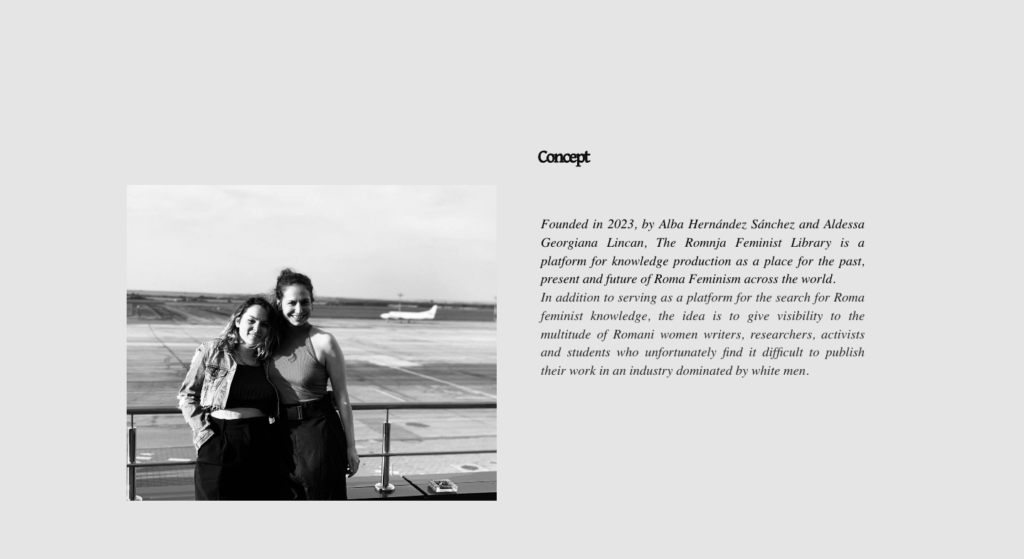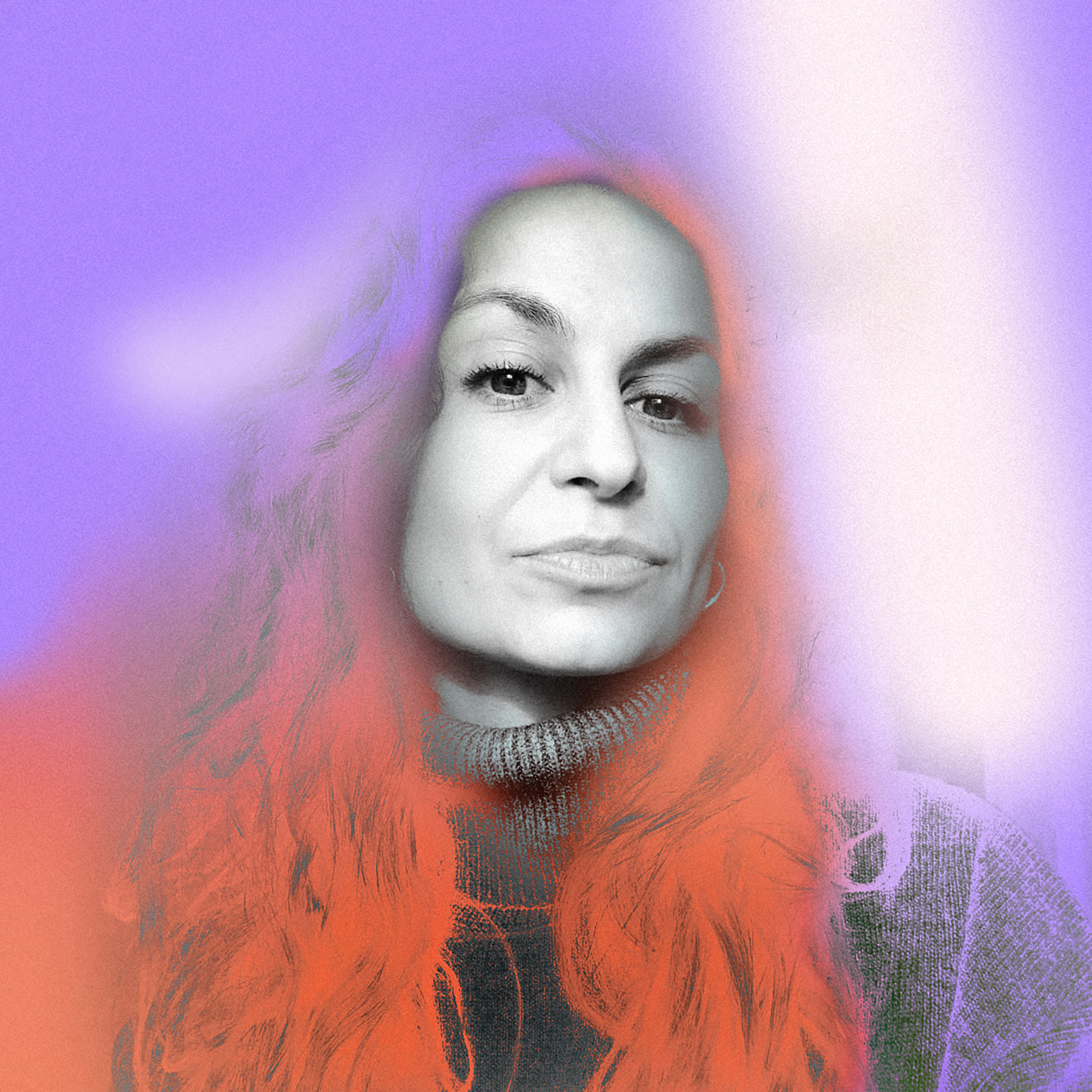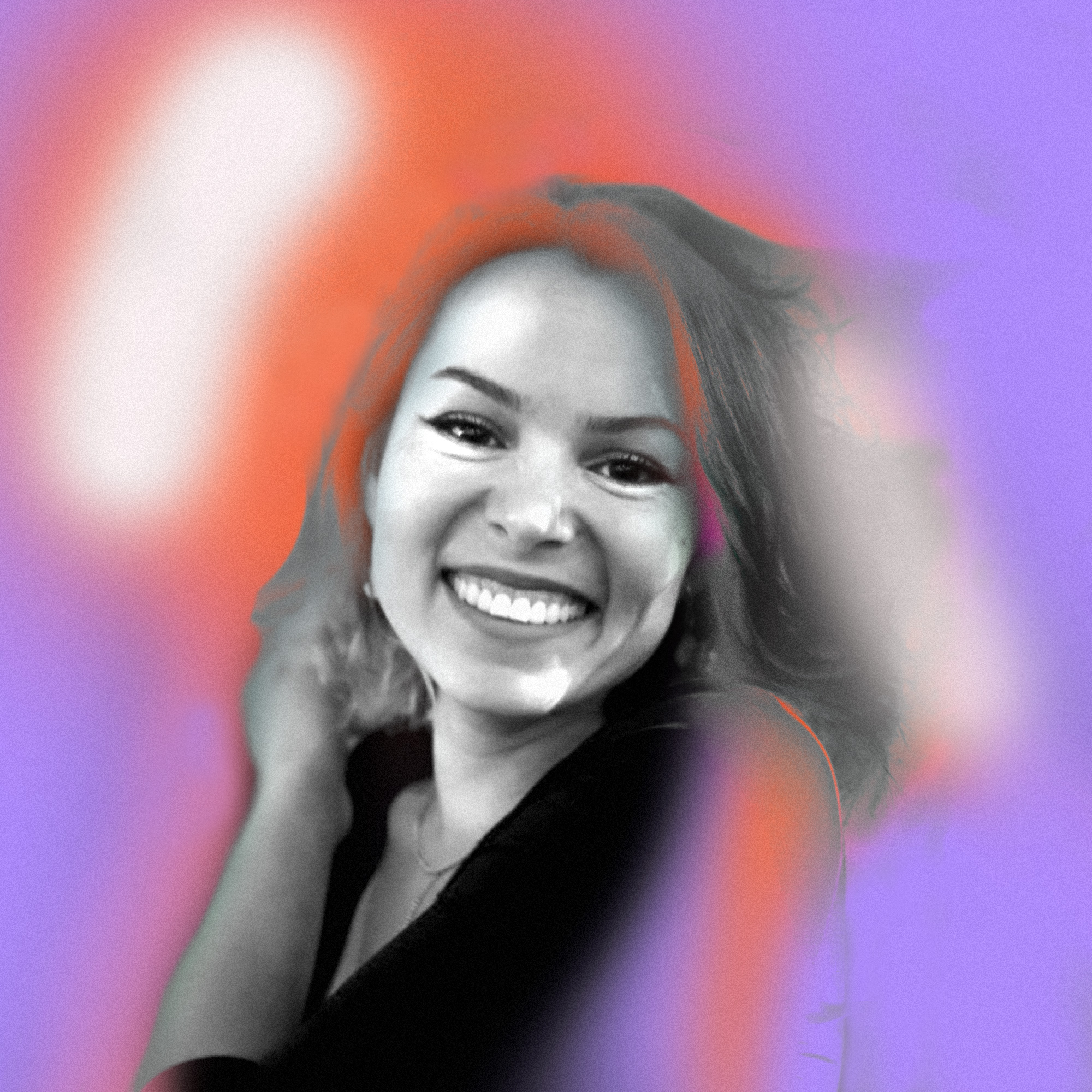The Romnja Feminist Library
The Romnja Feminist Library is a platform for Roma feminist critical knowledge. The platform serves as a safe space to bring visibility to the multitude of Romani women writers, researchers, activists, and students who unfortunately struggle to access academia in an industry dominated by white men. The goal of our platform is to combat xenophobia, sexism, racism, classism, homophobia, transphobia, as well as their oppressive intersections, by creating a Roma feminist library that responds to the imperative need to delegitimise hate speeches through scientific facts.
What will you be working on during the fellowship?
The project is intended to be built in two sections; the first one is about the collection of knowledge produced by Roma feminist women and Roma LGBTQA+ in order to create a space that serves as a source of information where to find critical knowledge written by Roma feminists. In it you will be able to find articles, writings, personal opinions and other information within the parameters of racism, sexism, classism, homophobia, among others, that affect the Roma community, especially Roma women and girls from an intersectional perspective. At the same time, it will serve as a platform where Roma students, activists, etc. can publish their productions trying to eliminate the invisible barrier that limits non-white people to give visibility to their knowledge. The second section of the project, will be destined to the creation of updated knowledge through podcasts and interviews with different students, activists, academics and influential Roma women on different current topics, where issues of common and personal interest about experiences, concerns, visions of the future, etc. will be discussed.
To what future do you aspire?
We aspire to a future where Roma women and LGBTQ+ Roma people will be the narrators of their own life experiences and knowledge. Also we aspire to a future where the works of Roma women LGBTQ+ Roma will be part of the mainstream knowledge and academia. Not at least we aspire to a future with role models for the young Roma women and girls.
What does being a risktaker mean to you?
We are aware that being risktakers makes us more responsible to create our project with care, love and respect towards our community. Further we see it as an opportunity to bring knowledge on Roma women in mainstream spaces and to make visible the work produced by our community.
The interview
1. What is the question we should definitely ask you (and how would you answer it)?
How do you see your initiative developing through the years?
We see our initiative developing as a powerful source of knowledge and a place for the past, present and future of Romnja feminism worldwide. We envision it as a space where we honour our Romani sisters’ contributions by creating a platform to celebrate our histories, resilience(s), and struggle(s). This online space is dedicated to Romnja women and girls, and through the Romnja Feminist Library, we proudly build a place to reclaim and recognize our feminist knowledge, which has been unjustly denied to us.

But we would say that this is not just an initiative for us; it’s an empowering political act and a shared space. We’re taking back control of our stories and knowledge(s) that have been silenced for too long. This space is where we challenge oppressive systems and fight for justice and equity. With the Romnja Feminist Library, we celebrate our individual and collective stories and stand against those who tried to erase us.
2. One of your main objectives during the fellowship is the creation of a website called “The Romnja Feminist Library”. Could you please explain what it is and how you plan to proceed with the library?
The name is “The Romnja Feminist Library” – we decided to use the plural feminine word in the Romani language, *Romnja, which means Romani women, in order to put the focus on the feminist perspective of our work and to make it clear as a space dedicated mainly to Romani women and girls.
For us, it is very political to build this platform from scratch with our perspective, thinking what is the best way to do so that it can be reached by those with the least access to this type of space. And, of course, we enjoy the learning process and the results of it, which seems very exciting and valuable until now.

In “The Romnja Feminist Library”, visitors will find a variety of published materials and access to Roma education, health, labour, justice, studies on violence, Roma feminism, activism, queer and LGBTQ+, intersectionality, art and culture, history and memory, etc. We are also planning to have new materials written by Roma women and girls and also to display a series of interviews and podcasts with Romnja feminists, Queer LGBTQ+ and Roma allies within the ‘Living Archive’ section. Moreover, we will also try to publish news and mapping of Romnja NGOs; over time, we will develop it more. And of course, there will also be our contact so anyone can reach us with feedback and how they would like to contribute to the library.
3. Is there anything like “The Romnja Feminist Library” already available?
After our research, we found some online platforms for Roma in general, some websites and social media pages dedicated to Romani women, for which we are thankful and inspired. But it’s always better to have more spaces dedicated to giving visibility to Romani women and girls and see how other Romnja have great ideas.
Through the library, we think that it brings spaces for a more critical, broader and intersectional perspective for the knowledge production of Romnja in various formats such as writing, arts, podcasts, etc. We are open to gathering the fantastic work done by our sisters while showing the public how rich our potential is to create knowledge. We believe and envision this initiative as not just about individuals but all coming together collectively. We can only create a strong and revolutionary space where Romani women’s voices and experiences are heard and reached by stretching our potential and collaborating. So, with that, we encourage other Romnja to contact us and be part of this collective effort by including their feminist knowledge in it.
4. We asked you that you bring two written pieces that are important to you and that you are likely to publish in your library. What have you come up with?
The first piece is a poem written by Aldessa, and it is in Romani language. The poem is about her experience as a Roma woman with multiple identities who learned to navigate and be in between worlds. You can find it here
Title: Maskar e lumjende
Produced within “Possible Worlds” workshops
Text and voice: Aldessa
Music: Sofia Zadar
Audio: Chlorys
The second piece is an article about knowledge production of Romani women is “Transgressing Borders:: Challenging Racist and Sexist Epistemology” by Angela Kózcé from 2018. We will not discuss the article here, we leave it for you to read it, but we can resonate with some of the ideas that she brings in it.
Angela argues:
“Romani women, political activism, and feminist intellectual thought are deeply connected and embedded in the restructuration of economic, social, and political structures…”, “… Romani women created some space for activism and encouraged activists to transform silence into voice and action…”, “…however their work is classified as “activist knowledge” by non-Roma, mainly male, scholars, who deem this kind of knowledge irrelevant and tainted by subjectivity…”, “… The politics of location, standpoint, and positionality play an important role in knowledge-making …” (Kóczé 2018)
We recognize the transformative knowledge produced by Romani women activists, scholars, and artists who contribute to the library with their knowledge from across the globe – acknowledging their significant impact on social and political changes at local, national, and international levels. We see how Romani women and girls work tirelessly in every context in the country they’re living in, and most of the time, their efforts are not visible. At the same time, when Kóczé argues about Romani women creating spaces for activism and encouraging the transformation of silence into powerful voices and actions, this aligns with our vision for the library. We aim to amplify the voices of Romani women and girls, who have all too often been marginalized and silenced by non-Roma actors. Through the library, we provide a platform for their knowledge to be recognized, valued, and integrated into different fields such as academia, political, and activist discourses.
Sadly, we have observed how Romani women are pushed into the activism field due to the sexism and racism they face when trying to access the labour market, which is very hierarchical and white. Even with all the job requirements, we are still left out of it. Their invaluable knowledge is frequently neglected and dismissed by non-Roma, predominantly male, who label it as “activist knowledge” and undermine its relevance through subjective judgments. Through the “Romnja Feminist Library”, we stand firmly against this discriminatory practice and seek to rectify the injustice by elevating and valuing the transformative knowledge of Romani women.
The politics of location, standpoint, and positionality, as discussed by Kóczé, are essential in knowledge-making. We believe that the library is a powerful manifestation of this idea. As Romnja activists, we have experienced the whitewashing of our stories, appropriation of our spaces, and distortion of our experiences by non-Roma. The library serves as a space where we reclaim ownership of our narratives, offering insights based on our lived realities and perspectives. This reclamation is central to our initiative, driven by our political position to challenge and confront oppressive systems that have historically marginalized and subordinated us.
5. How do you, as a fellow, perceive the Risktakers Fellowship so far?
What we really like is that the Risktakers Fellowships supports more Risktakers simultaneously, which allows us to connect and share with other fellows from different countries and learn from each other’s initiatives and struggles.

